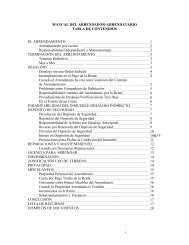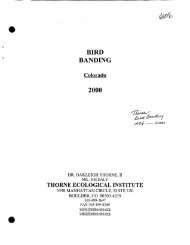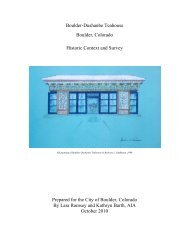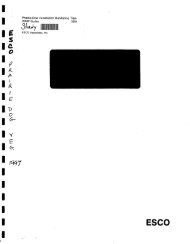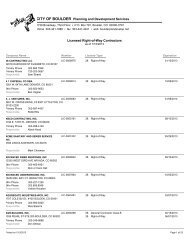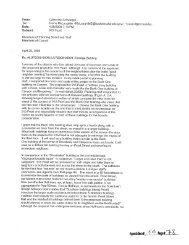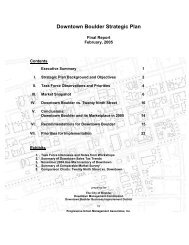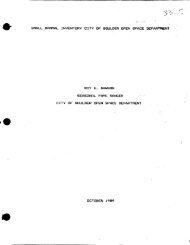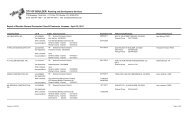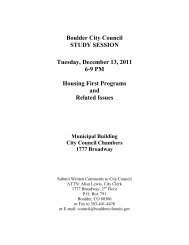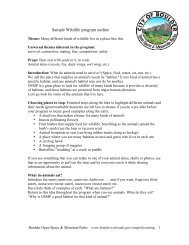Suzy Ageton George Karakehian KC Becker Tim ... - City of Boulder
Suzy Ageton George Karakehian KC Becker Tim ... - City of Boulder
Suzy Ageton George Karakehian KC Becker Tim ... - City of Boulder
You also want an ePaper? Increase the reach of your titles
YUMPU automatically turns print PDFs into web optimized ePapers that Google loves.
consumed. The combination <strong>of</strong> manufacturing, tours and product tasting attracts visitors from<br />
throughout the region and contributes to the city’s economic vitality. <strong>Boulder</strong> Valley<br />
Comprehensive Plan (BVCP) policy 5.13, Responsive to Changes in the Marketplace, recognizes<br />
that development regulations can impact the ability <strong>of</strong> businesses to respond to changes in the<br />
marketplace and states that the city will work with local businesses to make sure regulations and<br />
review processes provide a level <strong>of</strong> flexibility and are responsive to evolving industry sectors.<br />
While the economic benefit <strong>of</strong> these uses remains important, it also must be balanced with the<br />
city’s desire to encourage “eating while drinking,” consistent with responsible alcohol<br />
consumption practices.<br />
The following goals for the project were identified by staff to guide the analysis and<br />
development <strong>of</strong> proposed changes to the land use code.<br />
1. Support and accommodate the evolving nature <strong>of</strong> the microbrewery, distillery and winery<br />
industry and acknowledge their role in promoting tourism;<br />
2. Support and encourage food service as a complementary use to the consumption <strong>of</strong> beer,<br />
wine and spirits;<br />
3. Minimize impacts to adjacent residents and businesses;<br />
4. Prevent non-industrial uses from dominating industrial zones;<br />
5. Provide more clarity in the Land Use Code relative to uses; and<br />
6. Align the Land Use Code with state liquor laws and licensing.<br />
The proposed changes to the code include new definitions for these types <strong>of</strong> manufacturing uses,<br />
restrictions on the size <strong>of</strong> tap and tasting rooms, and new standards for restaurants at the<br />
manufacturing facilities. With these code changes, brewpubs in the commercial districts would<br />
be allowed to distribute or sell some <strong>of</strong> their products <strong>of</strong>f-site consistent with state law<br />
(distribution is currently prohibited in commercial zone districts).<br />
Key Issues<br />
The following questions are suggested to help guide council’s discussion on this item:<br />
1. Does council generally support the intent <strong>of</strong> the proposed Land Use Code changes to<br />
allow food service in breweries, wineries and distilleries in the industrial districts as<br />
detailed in the above goals?<br />
2. Does council agree with the code changes as proposed? Or, would council want to<br />
consider potential amendments related to the following:<br />
� a maximum square footage <strong>of</strong> a restaurant in a brewery, winery or distillery<br />
(see page 10 for potential size);<br />
� a minimum separation requirement, or buffer, between a brewery,<br />
distillery or winery and a nearby school? (see page 19 for potential language);<br />
� other changes?<br />
Agenda Item 5B Page 2



